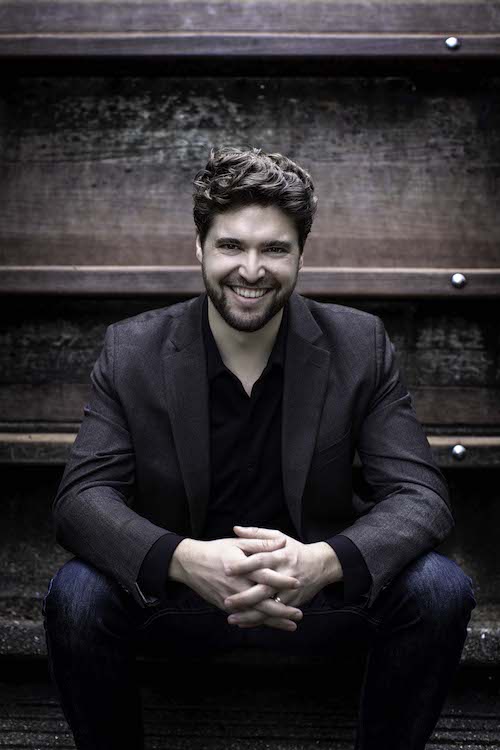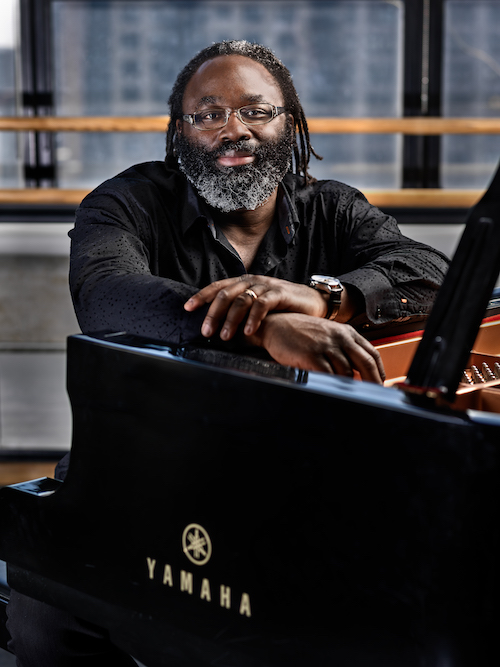Christian Reif brings enthusiasm and some haste to Baltimore Symphony program

Christian Reif conducted the Baltimore Symphony Orchestra Thursday night in the Music Center at Strathmore. Photo: David Kim
The Baltimore Symphony Orchestra is in the market for a new music director, to replace Marin Alsop, who stepped down last September. Each guest conductor that takes the podium with the ensemble could become a candidate for the position, although orchestra management has given no hints yet. The latest young face to take the helm was German-born conductor Christian Reif, with a varied program Thursday night in the Music Center at Strathmore.
Reif is at the start of his career, coming off studies and residencies at Juilliard, New World Symphony, San Francisco Symphony, and Tanglewood. This season he is taking a number of guest turns in various places. He is currently music director of the Lakes Area Music Festival of Minnesota. He may be familiar to those who spent the pandemic lockdowns watching livestream concerts, from a video concert he made for NPR with his wife, soprano Julia Bullock.
As in that online performance, Reif’s main asset proved to be his musicality and sensitivity as an accompanist. He opened with “Mänadentanz,” an orchestral arrangement of a vivid scene from Hans Werner Henze’s opera The Bassarids. Last heard from the NSO in 2013 under Christoph von Dohnányi, it depicts the brutal end of the ruler of Thebes, Pentheus. Tricked by Dionysus to take part in the god’s frenzied celebrations, Pentheus disguises himself as a woman. Discovered, he is torn apart by the Maenads, among whom are his own mother and sister.
Reif led the work with admirable precision of gesture, cuing the pile-up of entrances with crisp efficiency. Giving the opulent range of percussion instruments almost unlimited scope, this interpretation brought out the Bernstein-esque revelry of the bacchanal. At the climax, beautiful solos from horn and principal cellist Dariusz Skoraczewski, giving voice to the dying Pentheus, had room to sing. A fury of clashes in the orchestra swelled to a discordant climax.
Reif’s best work came in a skillfully etched rendition of Mozart’s Symphony No. 39, the least appreciated of the composer’s last three symphonies, composed as a set in the summer of 1788. Careful attention to articulation differences helped sculpt the slow introduction to the first movement, but a hasty tempo in the Allegro section gave more than a wild ride. The emphasis in the fast movements was too much on impetuous speed.
Unfortunate, because the delicate second movement stood out as utterly charming Mozart. The pacing had forward motion but allowed every detail to be set gently in place, with transparent balances across the ensemble. The Menuetto felt too brisk for an Allegretto, a haste that stood out even more in the charming Trio, where the clarinetist and flutist added dizzying ornaments on both repeats. With a little more space, this could have equaled the slow movement in charm.
The musicians of the BSO could certainly play the finale as fast as Reif pushed them, but the results were harried. In the third and fourth movements, Reif lost some control of the ensemble, as sections occasionally rushed ahead of the already rapid beat. His dancing movements and showboating hand gestures distracted from the music as well. More minimal conducting may have kept things together more effectively.

Awadagin Pratt. Photo: Rob Davidson
The BSO co-commissioned the new piano concerto Rounds from composer Jessie Montgomery, which opened the second half. Premiered in March by the Hilton Head Symphony Orchestra, it is a genial piece, given a relaxed vibe by its soloist, pianist Awadagin Pratt, and the BSO strings. Pratt rolled easily through the initial running figures at the keyboard, with a descending melody marked out by the patterns, somewhat reminiscent of Ravel in style.
Montgomery’s harmonic palette in the piece is pleasingly varied, as the second section featured a more active theme in bitonal chords, echoes of Stravinsky’s Petrushka. In her program note, Montgomery likened these musical ideas to birds flying in circles and the infinite patterns of fractals. These ideas returned in a rondo-like form throughout the piece, in alternation with slow interludes, the piano’s shimmering meditation backed up by unison melodies and whirring patterns in the strings.
A long cadenza marked the approach to the final statement of the main theme. This solo passage was partly left to Pratt to improvise, and it meandered hazily through a number of ideas. Pounded octaves led to a moment of surprise, some notes struck directly on the strings directly under the piano’s lid.
This new concerto, also inspired by the theme of dance that was the heart of this program, diverted the ear and the mind, without making much of an impact with virtuoso fireworks for either soloist or ensemble.
Where the orchestra needed a more seasoned hand most was in the concluding Suite from Strauss’s Der Rosenkavalier. With the large orchestral forces, as in the “Mänadentanz,” Reif tried to micromanage the vast panoply of details, but the added fussiness obfuscated more than clarified. Individual musical contributions were solid, including the horn solos in the overly tumultuous opening, and the gentle sighing of the oboe, accompanied by the shimmering chords of the Silver Rose music.
Reif had the best effect in the waltzes of the middle section, full of Viennese-style rhythmic hesitations and heart-on-sleeve sentimentality. Concertmaster Jonathon Carney sweetened the pot with nostalgic violin solos, but both the Trio and Duet sections based on the opera’s poignant final scene seemed rushed. The breathless return of the Silver Rose chords, adorning the end of the Octavian-Sophie duet, underscored the over-fast tempo. The mayhem of the conclusion, the cacophonous music surrounding Ochs’ exit earlier in the third act, was maximal.
The program will be repeated 8 p.m. Friday and Saturday and 3 p.m. Sunday at Meyerhoff Symphony Hall. bsomusic.org
